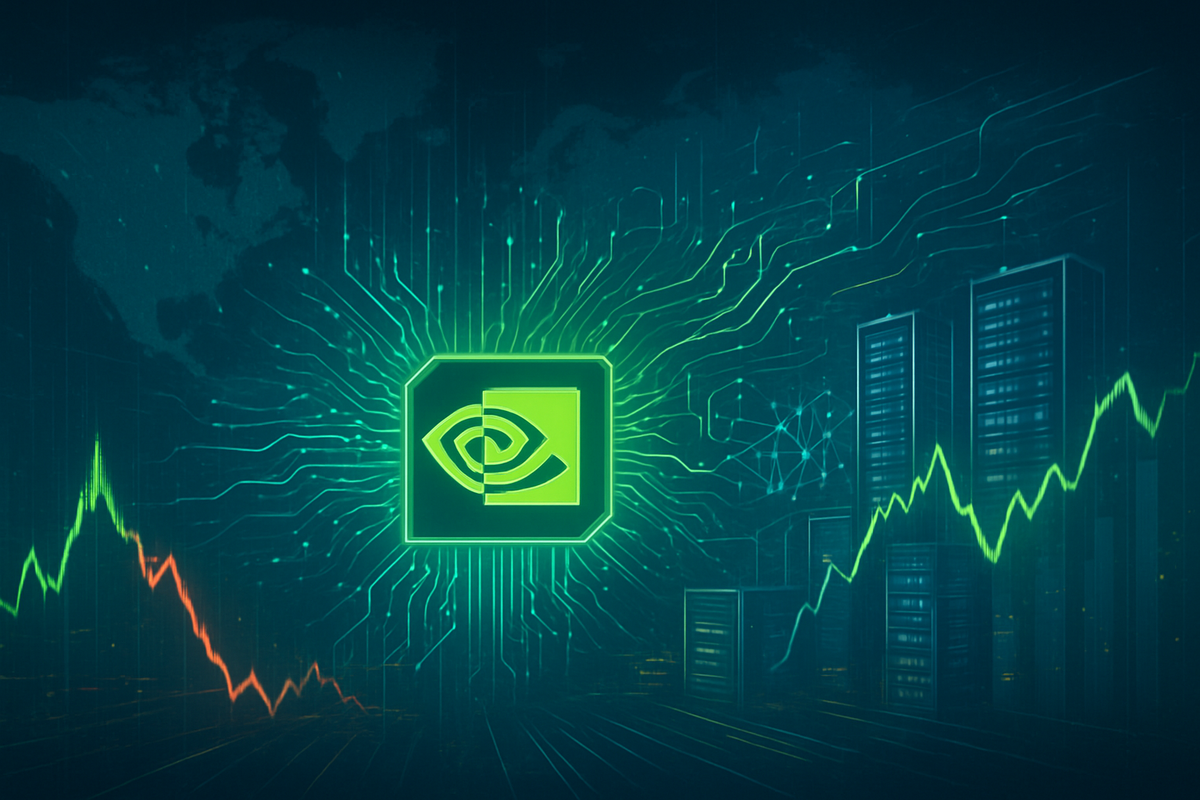
Nvidia (NASDAQ: NVDA), the undisputed leader in artificial intelligence (AI) hardware, has experienced a rollercoaster ride in the financial markets leading up to November 7, 2025. While the company has demonstrated an astounding 36% year-to-date stock increase and a staggering 1,192% gain over the past five years, reaching an all-time high of $212.19 on October 29, 2025, the beginning of November brought a sharp, albeit perhaps temporary, correction. This recent downturn, seeing the stock fall over 16% in just four trading sessions, wiped out an estimated $530 billion to $800 billion in market capitalization, sparking a broader re-evaluation of high valuations across the AI sector.
This paradoxical movement—robust long-term growth juxtaposed with sudden short-term volatility—underscores the intense market scrutiny and speculative nature surrounding the AI boom. While Nvidia's core business remains incredibly strong, driven by insatiable demand for its high-power graphics chips for data centers, the market's reaction suggests a shift from unbridled exuberance to a more cautious assessment of future returns. The immediate implications include heightened market volatility, a palpable "risk-off" sentiment among investors, and a critical re-evaluation of the often-lofty valuations assigned to AI-related companies.
Nvidia's AI Dominance Tested by Market Realities
Nvidia's journey to becoming a nearly $5 trillion market cap giant has been fueled by its relentless innovation and strategic positioning in the burgeoning AI landscape. The company's Blackwell AI processor is now in full production, with orders from leading cloud service providers (CSPs) reportedly surpassing all previous records. This demand is further bolstered by the eagerly anticipated Q3 Fiscal Year 2026 earnings, expected around November 19, 2025, which investors hope will reaffirm the company's robust financial health following its strong Q3 Fiscal Year 2025 results reported in November 2024.
However, the dramatic decline in early November 2025, which saw the stock trading around $181.62 to $182.71 on November 7, was a stark reminder of market sensitivities. This correction, while significant, followed a period of meteoric rise, prompting some analysts to question the sustainability of such rapid growth. The downturn was not isolated, as other AI chipmakers also experienced a slide, indicating a broader market concern about an "AI bubble" and the potential for a technical breakdown across the wider technology sector. Despite this, an AI model projects a recovery toward $214 by November 30, 2025, suggesting that institutional accumulation and continued demand for Blackwell GPUs could quickly reverse the recent losses.
Adding to the narrative of Nvidia's robust underlying business are a series of strategic announcements throughout 2025. At CES 2025 in January, Nvidia unveiled its next-generation GeForce RTX 50-series GPUs (RTX 5090, 5080, 5070 Ti, and 5070), powered by the new Blackwell AI chip, targeting gamers and creative professionals. This was followed by GTC 2025 in March/April, where the company detailed the Blackwell Ultra GPU and associated platforms, set for launch in the second half of 2025, and pre-announced the future Rubin architecture for 2026, showcasing a clear product roadmap extending years into the future. New Spectrum-X Ethernet and Quantum-X InfiniBand networking switches utilizing silicon photonics were also introduced, highlighting Nvidia's expansion beyond just GPUs into comprehensive AI infrastructure.
Furthermore, late 2025 saw a flurry of high-profile strategic partnerships and investments. On November 6, 2025, Nvidia announced a groundbreaking partnership with Samsung (KRX: 005930) to construct the world's first AI factory, integrating chip manufacturing with intelligent computing, to be powered by over 50,000 Nvidia GPUs. This followed an October 28, 2025, announcement of a strategic partnership with Nokia (HEL: NOKIA) to develop AI-RAN products for AI-native 5G-Advanced and 6G networks, involving a substantial $1 billion investment by Nvidia in Nokia. The same day, Nvidia confirmed collaborations with U.S. Department of Energy labs and companies like Oracle (NYSE: ORCL) and HPE (NYSE: HPE) to build advanced AI infrastructure, including the Solstice supercomputer, which will feature 100,000 Nvidia Blackwell GPUs. A partnership with Palantir (NYSE: PLTR) was also forged to create an integrated technology stack for operational AI. Perhaps most significantly, in September 2025, Nvidia announced plans to invest up to $100 billion in OpenAI, supplying data center chips and taking a financial stake in the AI company, as part of a broader "Stargate Project" aimed at building extensive AI infrastructure.
Winners and Losers in the Wake of Nvidia's Surge
Nvidia's performance inevitably creates a ripple effect across the technology and semiconductor ecosystems, defining clear winners and potential losers. The most apparent beneficiaries are the cloud service providers (CSPs) and enterprises heavily investing in AI infrastructure, such as Microsoft (NASDAQ: MSFT) with Azure, Amazon (NASDAQ: AMZN) with AWS, and Alphabet (NASDAQ: GOOGL) with Google Cloud. These companies are among Nvidia's largest customers, and their ability to deploy cutting-edge AI models and services is directly tied to the availability and performance of Nvidia's GPUs. Their continued demand for Blackwell and future architectures ensures a steady revenue stream for Nvidia and solidifies their own competitive edge in the AI race.
Furthermore, companies that have forged strategic partnerships with Nvidia stand to gain significantly. Samsung (KRX: 005930) will benefit from its collaboration on the AI factory, potentially enhancing its chip manufacturing capabilities and securing a pivotal role in the future of AI infrastructure. Nokia (HEL: NOKIA) will leverage Nvidia's $1 billion investment and expertise to accelerate its development of AI-RAN products for AI-native 5G-Advanced and 6G networks, positioning itself at the forefront of telecommunications innovation. Oracle (NYSE: ORCL), HPE (NYSE: HPE), and Palantir (NYSE: PLTR) will see their respective AI offerings strengthened by deep integration with Nvidia's powerful computing platforms, enabling them to deliver more robust and efficient AI solutions to their clients. OpenAI, with Nvidia's massive investment and commitment to supplying data center chips, is poised to further accelerate its research and development, maintaining its leadership in generative AI.
Conversely, companies that directly compete with Nvidia in the high-performance computing and AI chip space, such as AMD (NASDAQ: AMD) and Intel (NASDAQ: INTC), face intensified pressure. While both have their own AI chip initiatives and have made strides in specific market segments, Nvidia's entrenched ecosystem, continuous innovation, and strategic partnerships make it a formidable competitor. Any slowdown in Nvidia's growth could signal a broader market saturation or increased competition, but for now, Nvidia's dominance means competitors must work harder to carve out market share. Additionally, companies heavily reliant on older chip architectures or those slower to adopt AI-driven strategies might find themselves at a disadvantage, struggling to keep pace with the accelerated innovation cycles driven by Nvidia's advancements. The recent market correction in AI stocks, including Nvidia, could also impact smaller, less established AI hardware or software startups, as investor sentiment shifts towards proven profitability and away from speculative growth.
Broader Significance: AI's Enduring Impact and Geopolitical Tensions
Nvidia's trajectory is more than just a corporate success story; it is a bellwether for the broader industry trends shaping the future of technology. The insatiable demand for its GPUs underscores the fundamental shift towards AI-first computing, where parallel processing and specialized hardware are paramount. This trend extends beyond data centers, influencing the development of autonomous vehicles, robotics, and even personal computing with the introduction of AI-powered RTX 50-series GPUs. The continuous advancement of architectures like Blackwell and Rubin signifies a sustained commitment to pushing the boundaries of computational power, ensuring that AI capabilities continue to expand at an exponential rate.
The ripple effects of Nvidia's dominance are felt across the entire technology supply chain. Foundries like TSMC (NYSE: TSM), which manufactures Nvidia's advanced chips, benefit from increased orders and the need for cutting-edge fabrication processes. Software developers are increasingly optimizing their applications for Nvidia's CUDA platform, further entrenching its ecosystem. The strategic partnerships, particularly the Samsung AI factory and the Nokia 6G collaboration, highlight how AI is not just transforming software but also hardware manufacturing and telecommunications infrastructure, creating entirely new paradigms for how technology is built and deployed.
However, the wider significance also includes complex geopolitical and regulatory implications. Ongoing U.S. export restrictions on advanced AI chips to China continue to be a significant concern for Nvidia. China represents a substantial market for the company's data center revenue, and these restrictions have impacted its market share in the region. Nvidia's CEO Jensen Huang has openly voiced concerns about China's potential to outpace the U.S. in the AI race due to different regulatory environments and energy costs, suggesting that an overly restrictive policy could inadvertently accelerate China's indigenous AI chip development. This geopolitical tension adds a layer of uncertainty to Nvidia's long-term international growth strategy and underscores the strategic importance of AI technology on a global scale. Historically, similar technological arms races, such as in the space or nuclear sectors, have often led to significant government intervention and policy shifts, indicating that the AI landscape will likely see increased regulatory scrutiny and potentially new international agreements or trade frameworks in the coming years.
What Comes Next: Navigating the Future of AI
Looking ahead, Nvidia faces both immense opportunities and significant challenges. In the short term, investors will be keenly watching the Q3 Fiscal Year 2026 earnings report, expected around November 19, 2025. A strong report, particularly regarding future guidance for Blackwell and Rubin architectures, could quickly alleviate concerns from the recent market correction and reaffirm investor confidence. The projected recovery towards $214 by November 30, 2025, according to AI models, suggests a belief in the underlying strength and institutional support for Nvidia's stock. Continued strong demand from hyperscalers and enterprises for AI infrastructure will be a key driver.
In the long term, Nvidia's strategic pivots will be crucial. The company's expansion beyond pure GPU sales into comprehensive AI platforms, networking, and even AI factory construction demonstrates a vision to become the foundational layer for the entire AI ecosystem. The "Stargate Project" with OpenAI and other collaborations to build advanced AI infrastructure are indicative of a shift towards providing full-stack AI solutions. This could create new market opportunities in AI-as-a-service, specialized AI cloud offerings, and integrated hardware-software solutions that are harder for competitors to replicate. Potential challenges include intensifying competition from custom AI chips developed by tech giants (e.g., Google's TPUs, Amazon's Inferentia), the ever-present threat of geopolitical trade restrictions, and the need to continually innovate to stay ahead in a rapidly evolving field.
Potential scenarios and outcomes for Nvidia include continued market leadership, where its ecosystem and innovation pipeline ensure sustained growth, possibly reaching a $10 trillion valuation by the end of the decade if the AI boom continues unabated. Alternatively, increased regulatory pressure, particularly concerning antitrust or export controls, could temper its growth. The emergence of a viable alternative AI computing paradigm could also pose a threat, though Nvidia is actively diversifying into areas like quantum computing research to mitigate this. Ultimately, Nvidia's ability to execute on its ambitious product roadmap, manage geopolitical complexities, and adapt to evolving market demands will determine its trajectory in the coming years, solidifying its role as a pivotal force in the global technological landscape.
Wrap-up: Nvidia's Enduring Influence in a Volatile AI Market
Nvidia's recent market performance, characterized by record-breaking growth followed by a sharp correction, serves as a powerful microcosm of the broader AI market's current state: immense potential intertwined with significant volatility. The key takeaway is that while market sentiment can shift rapidly, the fundamental demand for Nvidia's cutting-edge AI hardware and comprehensive ecosystem remains exceptionally strong. The company's relentless innovation, exemplified by its Blackwell and upcoming Rubin architectures, alongside its aggressive strategic partnerships with industry giants like Samsung, Nokia, Oracle, and OpenAI, positions it as an indispensable enabler of the AI revolution.
Moving forward, the market will continue to assess the true value and sustainable growth trajectory of AI-centric companies. Nvidia's ability to convert its technological leadership into consistent financial performance, particularly in its upcoming earnings reports, will be critical. Investors should closely watch for developments in its product roadmap, the success of its strategic collaborations, and any shifts in the geopolitical landscape concerning AI chip exports. The recent downturn, rather than signaling a fundamental weakness, might be interpreted as a necessary market recalibration, allowing for a more sustainable growth path. Nvidia's lasting impact is undeniable; it has not only shaped the present of AI but is actively architecting its future, making it a crucial stock to monitor in the evolving financial markets.
This content is intended for informational purposes only and is not financial advice







